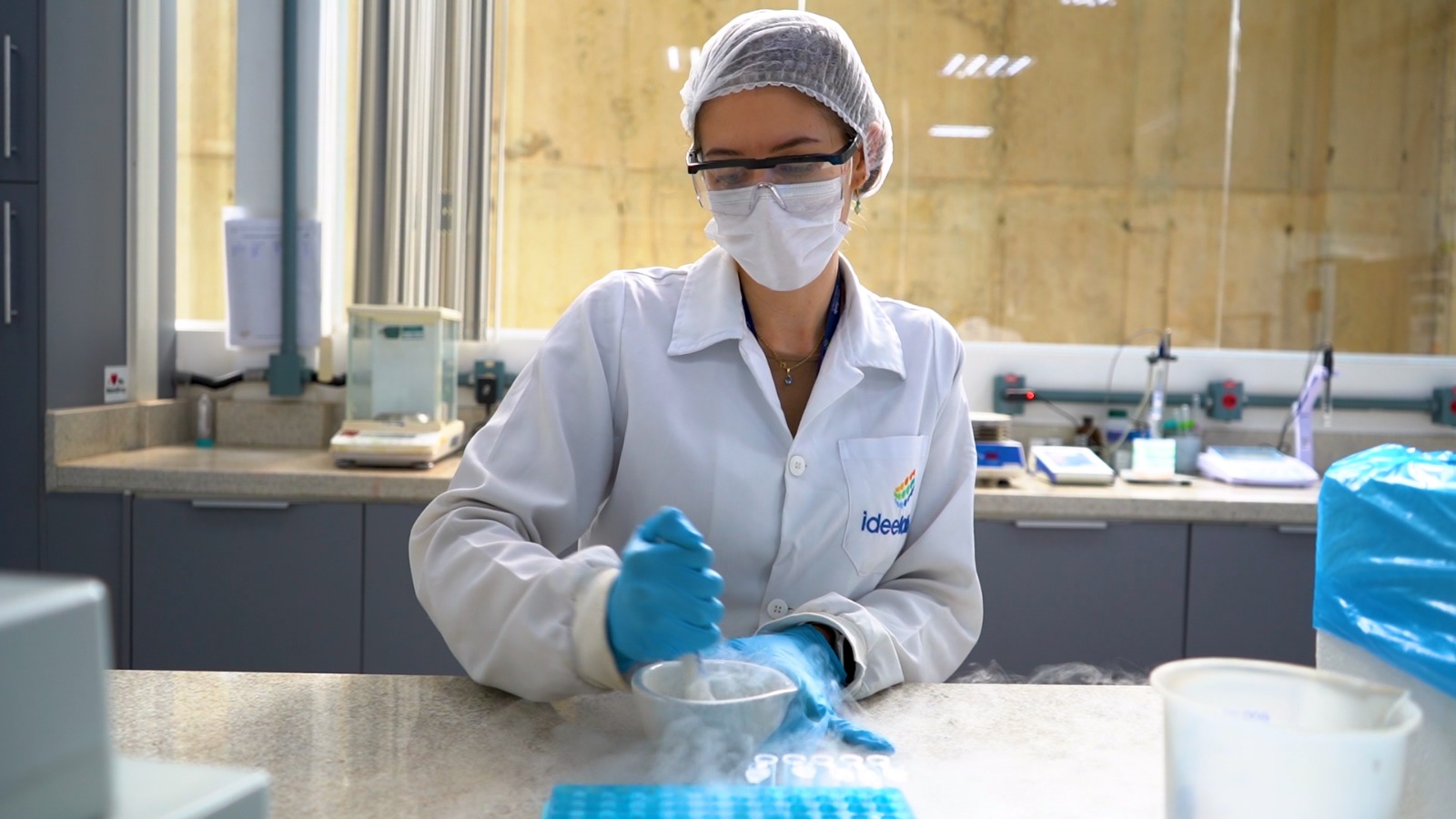

One important feature of Ideelab’s technology is its ability to combat pathogens that lodge in a plant’s conducting vessels (photo: Phelipe Janning/Agência FAPESP)
With support from FAPESP, the São Paulo startup is developing more efficient strategies to combat pathogens that threaten citrus farming; the technology will be presented at VivaTech in France.
With support from FAPESP, the São Paulo startup is developing more efficient strategies to combat pathogens that threaten citrus farming; the technology will be presented at VivaTech in France.

One important feature of Ideelab’s technology is its ability to combat pathogens that lodge in a plant’s conducting vessels (photo: Phelipe Janning/Agência FAPESP)

By Roseli Andrion | Agência FAPESP – Recent advances in our understanding of how plants and microorganisms communicate have inspired the startup Ideelab to develop biotechnological innovations that could help revolutionize disease control in citrus plants, a major challenge for Brazilian agribusiness.
Supported by FAPESP’s Innovative Research in Small Businesses program (PIPE), Ideelab will be one of ten companies invited by the Foundation to present its technology at the University of São Paulo’s (USP) stand at the international VivaTech fair, one of Europe’s largest startup and technology events. The fair takes place from June 11th to 14th in Paris, France.
The 2025 edition of VivaTech focuses on the new frontiers of technological innovation from economic, geopolitical, social, and environmental perspectives. Last year, 165,000 people visited the various stands at the fair.
“We’re really looking forward to participating in the fair, not just because of what we’ll learn, but because of the relationships and interactions we’ll have with other companies. We’ll be able to evaluate what works for our reality and even try to do something similar. It’s going to be a milestone in our journey,” says Ronaldo José Durigan Dalio, founder of Ideelab.
Molecular weapons
The company’s work is based on the fundamental principle that plants communicate with microorganisms through specific molecules called effectors – peptides and proteins that are produced naturally by them and interact with the pattern recognition receptors of the cultivars.
“This communication determines whether the interaction will benefit the plant or result in disease,” explains Dalio. “Based on the effector molecules, the plant can differentiate a ‘friend’ from an ‘enemy,’” the biologist simplifies.
The aim is to understand how beneficial microorganisms interact with citrus plants, and which of their secreted molecules result in improved productivity and protection against diseases. “Plants have coexisted with microorganisms for over 400 million years,” he says. “This recognition and communication occurs via proteins and organic molecules.”
Initially, the researchers mapped how the Phytophthora parasitica pathogen, which causes gummosis in citrus plants, uses effector molecules to bypass the plant’s immune system and cause disease. “We saw that, in susceptible plants, the pathogen implements ‘molecular weapons,’ and the plant is unable to defend itself,” he says. “Resistant plants, on the other hand, have a defense mechanism in another layer, which does not come into contact with the effector molecules. It’s like a second line of defense that prevents infection.”
This discovery has made it possible to develop more efficient disease control strategies not only for gummosis but also for other critical citrus diseases. “This is the case with greening, caused by the bacterium Candidatus Liberibacter asiaticus and transmitted by the psyllid insect, and diseases caused by Xylella fastidiosa [the ‘yellowing’ agent] and Xanthomonas species.”
From academia to the market
Ideelab’s history began when Dalio returned to Brazil after a doctorate at the Technical University of Munich in Germany, where he researched effector molecules. He then began working at the Sylvio Moreira Citriculture Center of the Agronomic Institute (IAC) under the supervision of researcher Marcos Antonio Machado.
At the institution, Dalio began applying the knowledge he had acquired to the diseases affecting citrus plants in Brazil. “I started being invited to present these lines of research at conferences, which resulted in interested companies approaching me about developing innovations based on these technologies.”
He then realized the need for a more agile, professional structure to respond to these demands. In partnership with Professor Sérgio Pascolatti from the Luiz de Queiroz College of Agriculture at the University of São Paulo (ESALQ-USP) in Piracicaba, Dalio founded Ideelab to develop innovative bio-inputs for Brazilian agriculture. “We started with five professionals about six years ago, and today we have 37 collaborators, including 12 doctors.”
The company’s name combines the German word for idea (idee) with lab (laboratory) because the aim has always been to be a laboratory for transforming ideas into innovation. “We wanted an international name so that, in the future, we could work towards internationalization – and that’s happening now. We needed a name that sounded good in several languages, and idee means idea in several languages.”
From the bench to the field
Dalio says an important differentiator of Ideelab’s technology is its ability to combat pathogens that lodge in the plant’s conductive vessels, such as the bacteria that cause greening. “These microorganisms colonize vessels and damage tissues. And it’s very difficult for a conventional chemical product to reach them. More refined techniques are needed to reach the target and protect the crops.”
The company already has proof of concept demonstrating the technology’s effectiveness and the professionals are currently working on refining product prototypes. “We’re at an intermediate stage. We still need to resolve issues such as the stability of the peptides, form of application, residual time, and interval between applications,” the researcher explains.
To this end, Ideelab has an innovation center in Piracicaba, a bioprocess unit, and is about to inaugurate an industrial facility in Cambé, near Londrina in the state of Paraná, dedicated to producing molecules with high added value and biotechnological complexity.
Benefits for the entire chain
According to Dalio, the technologies developed by Ideelab offer a sustainable alternative to traditional chemical pesticides. “It’s a product with a much lower carbon footprint, non-polluting and non-toxic to the environment,” he says. Thus, the benefits extend throughout the chain: producers can control diseases more efficiently and sustainably, the industry can obtain higher-quality products, and consumers can receive food with fewer chemical residues.
The company organizes its products into six categories, or generations, according to their biotechnological complexity. Generation 1 contains a single organism per bottle, while generation 2 brings together consortia of microorganisms in the same product. Generation 3 products are based on metabolites, and generation 4 products are based on effectors, peptides, and proteins. Generation 5 is dedicated to genomic editing, and generation 6 is interference RNA. “Generations 3 and 4 represent the next great wave of innovation in world agriculture, and it’s these that we’ve been focusing on in recent years.”
Although the current focus is on citrus plants due to their economic importance and the phytosanitary challenges faced by the sector in Brazil, the technology can be useful for different crops. “The concept can be applied to soybeans, eucalyptus, corn, cotton, bananas, strawberries, arugula, and other species.”
In addition to diseases caused by bacteria and fungi, the technology can be used to control insect vectors of disease. “We have a line of research looking for peptides and small proteins with an effect against insects such as psyllids and weevils, which are key pests of the cotton plant.”
International expansion
In addition to having an international-sounding name, Ideelab recently announced the hiring of a business representative in Boston, in the United States, who will be responsible for the internationalization strategy. The company will also participate in VivaTech. “The universe is already conspiring for this internationalization,” Dalio jokes.
Dalio points out that Brazil is at the forefront of developing bio-inputs and biotechnology for agriculture. “We’ll be able to present our experience and what we’re doing at a very innovative event and have relevant exchanges there,” he says. “In addition, this exhibition has the potential to help our internationalization process.”
Republish
The Agency FAPESP licenses news via Creative Commons (CC-BY-NC-ND) so that they can be republished free of charge and in a simple way by other digital or printed vehicles. Agência FAPESP must be credited as the source of the content being republished and the name of the reporter (if any) must be attributed. Using the HMTL button below allows compliance with these rules, detailed in Digital Republishing Policy FAPESP.





